| Reviews & Columns |
|
Reviews DVD TV on DVD Blu-ray 4K UHD International DVDs In Theaters Reviews by Studio Video Games Features Collector Series DVDs Easter Egg Database Interviews DVD Talk Radio Feature Articles Columns Anime Talk DVD Savant Horror DVDs The M.O.D. Squad Art House HD Talk Silent DVD
|
DVD Talk Forum |
|
|
| Resources |
|
DVD Price Search Customer Service #'s RCE Info Links |
|
Columns
|
|
|
Lord Peter Wimsey Mysteries: Set 2, The
"Our characters are at once, sir, opposite and complimentary....We're on the same wavelength."
"By jove, I never have seen such a chappie for whackin' the nail over the crumpet!"
Perfect television fare. Acorn Media has followed through on their March release of Set 1 (please read my review of that set here), to bring us The Lord Peter Wimsey Mysteries: Set Two, featuring the three remaining mysteries starring the irrepressible, delightful Ian Carmichael as Dorothy L. Sayers' posh, brilliant amateur detective. Titles included here are Murder Must Advertise, Five Red Herrings, and The Nine Tailors. These mid-70s films were previously released around 2002, so double-dippers need not pick-up this latest edition: the transfers and extras appear to be exactly the same (including some snippets of an interview with the late Carmichael). Newcomers to this series, however, and devotees of vintage British TV mysteries, are strongly advised to add The Lord Peter Wimsey Mysteries: Set Two to their DVD libraries--they're delicious.
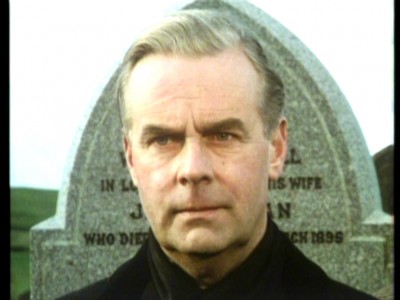
Murder Must Advertise
Episode synopsis: "Lord Peter goes deep undercover at Pym's Publicity to investigate the suspicious death of a young copywriter following his affair with a wealthy and indolent socialite."
A crackerjack mystery set in the world of advertising (a milieu former copywriter Sayers knew well), Murder Must Advertise is both quite amusing and rather unsettling at its denouement, when we get a look at a more serious side of the Wimsey character than we'd normally expect. Carmichael, as usual, is the whole show here, and he's frankly hilarious when he's posing as the junior copywriter at Pym's Publicity (middle-aged Carmichael may not look "junior," but he's effortlessly youthful in demeanor). Whether he's almost conking someone coming off the elevator with a tin can while showing a co-worker how to bowl a googlie in the hallway, or greeting a visitor at his office door with a yo-yo, Carmichael is a stitch as the "tow-colored haired, supercilious-looking blighter" (as he's described) who instantly charms the hardened girls in the steno pool, and who takes to advertising like a duck to water (Wimsey dashes off this ad copy for Dairyfield Margarine in nothing flat: "It's a far, far butter thing than I have ever eaten." Classic Wimsey).
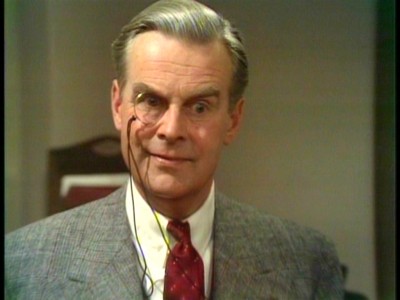
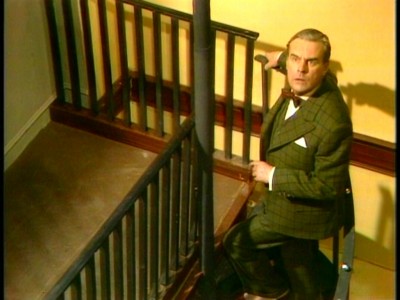
As funny as all those office shenanigans are, I was quite drawn to Carmichael's antics as "Bredon," his fictitious look-a-like cousin. Showing a romantic, mysterious dash that came over very convincingly, this "wilder form of Wimsey," if you will, was quite a compelling contrast to Carmichael's usual jaunty, entitled take on the character, from his lightening fast wrist-grab of coke-using socialite Dian de Momerie (sexy Bridget Armstrong tells Wimsey, "You're hurting me, harlequin," with suitable double meaning) when she tries to snatch off his harlequin mask at a costume ball, to his perilous high dive off a tall fountain into a shallow pool to convince Dian he's a desirable pursuit. There's a toughness to Carmichael here that I liked, echoed later in his flat statement defending his independence: "Nobody ever sends me anywhere. I go where I like." I've always enjoyed Wimsey's joie de vie, aided and abetted of course by a family fortune and an English class system that puts him on top due to birth right alone (watch the peasants snap-to at that "Lord" moniker). As Carmichael portrays him, life is for enjoying, regardless of what is going on around him. A good example comes at the beginning of the film, when Wimsey is seen to smile appreciatively at the sound of his baby nephew wailing in the background, just as the baby's exhausted father, Chief Inspector Parker (Mark Eden), shuffles in from a rough, sleepless night. It's not that Wimsey is unaware of others' troubles, it's just that he's lucky enough to be free of most of them (being single here, and rich, and relatively fancy-free to do what he likes, when he likes)--and he knows he's lucky. So when he first deliberately sets out to seduce the screwed-up Dian, and then later, at the film's climax, sends the murderer to his (or her) certain death to save the honor of their family, Wimsey can't fall back on his money to ease his conscience. He's saddened by Dian's death, and momentarily stricken when the murderer sees the wisdom of Wimsey's advice, and leaves to meet his fate. It's a good broadening of the character, and Carmichael is up to the task here.
Five Red Herrings
Episode synopsis: "When the body of an unpopular artist is found in a stream, it's up to Lord Peter to determine which of the six suspects could have committed the crime."
Nicely dense (in the details and clues) whodunit with Lord Peter on vacation in Scotland. I've written this before, but apparently I'm not like most mystery-lovers in that I don't try to play sleuth, solving the mystery as the film or book progresses. I like to get swept along, and then swamped, by the various red herrings and details. What's the fun in knowing the murderer before the detective does? And certainly with Five Red Herrings, I may have suspected who the real murderer was (I got it right!), but I didn't know for sure--nor, more importantly, the "how." Sayers provides enough motives for "20 Red Herrings" here, with dodges and darts down wrong hallways that had me thoroughly (and wonderfully) second-guessing every character's place in the larger scheme of the crime. Of all of the Carmichael Wimsey's I've seen, this one seems to be the most focused on the mechanics of his investigation, so as a procedural, it's quite good (although some of the production design was troubling, such as the costuming for Russell Hunter's character--that phony beard and wig looked like something out of my Sunday school passion play days). I particularly enjoyed the long final sequence where Wimsey recreates the crime, proving to be as athletic as he is intellectually cagey as he pedals furiously over the Scottish highlands (good location work here, wherever they may have filmed it).
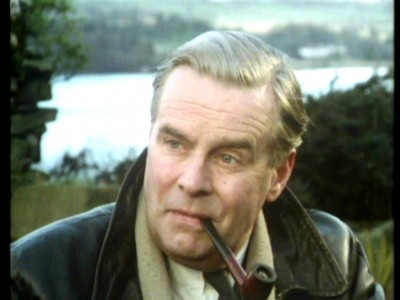
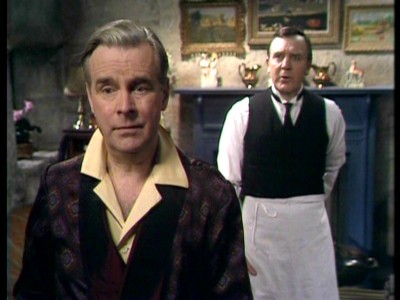
As well, it's always great to see Glyn Houston back as Lord Peter's manservant, Bunter. Houston and Carmichael have an easy chemistry between them that never veers into broad comedy, but which suggests a bemused attachment that's rooted in true friendship, regardless of class restrictions (in the following movie, their backstory is dramatized). Indeed, part of their appeal to each other seems to stem from that division, with Bunter pleased that the friendly Lord Peter is a will-o'-the-wisp adventurer and not an indolent aristocrat, while Lord Peter is continually impressed with the skills and arts that Bunter has mastered. It's an egalitarian arrangement that's at once inexplicable and transcendent (they are separated by class, and they do "know" their places...but still they operate largely as equals, with appreciation coming from both sides). There are quite a bit of scenes between the two fine actors here, many of them lightly amusing (I particularly like Wimsey's shock at the reticent-but-proud Bunter's assertion that he's a fair painter, along with his many other talents), but the one moment in the entire film that stood out for me was an all-too-brief shot of Wimsey, tucked back into a quaint little dining room in his Scottish cottage, as he silently contemplates his fine wine and the wonderful dinner made for him by the talented Bunter. It's a quiet, evocative moment for a character who's usually bounding around, bursting with energy and sarcastic wit, and as always, Carmichael essays it beautifully.
The Nine Tailors
Episode synopsis: "Stranded in a sleepy village after a car accident, Lord Peter quickly stumbles upon a decades-old case of stolen emeralds, unidentifiable corpses, and coded messages."
An entertaining mystery in the series, to be sure, but this time, going against my own statement above (naturally), The Nine Tailors was far too easy to solve (hey, I didn't try), despite the well-constructed story. I don't want to always be two steps ahead of Wimsey when he's tracking down the murderer, but one couldn't help it with the obviousness of the solution, clever as it was (not helped by the simplistic, foreshadowing direction, either), so that deflated the film a bit for me. Certainly the best aspect of this adaptation of The Nine Tailors was seeing Lord Peter's and Bunter's backstory dramatized, as they become fast friends in the trenches of WWI...although curiously (and I think unfortunately), they left out Wimsey's nervous breakdown (what a treat that might have been for Carmichael to portray). Glyn Houston and Ian Carmichael have their act down pat here, and they make a wonderful screen team. It's too bad that this was the final adaptation for the two. Beautiful location work helps at that magnificent church featured here, and the notion of church bells as inanimate, unknowing, yet malevolent forces of death is too cool, but the tepid, tip-off direction siphons off a lot of the fun.
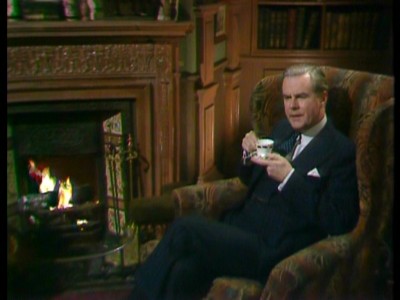
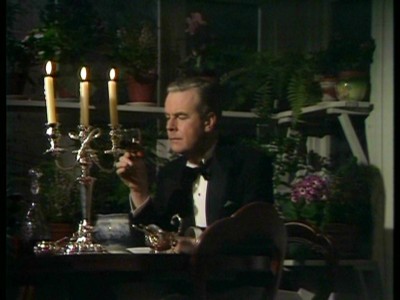
The DVD:
The Video:
As with Set 1 of The Lord Peter Wimsey Mysteries: if you've seen one of these full-screen, 1.33:1 transfers from original 1970s BBC materials, you've probably pretty much seen them all. Don't expect digital perfection, and you'll be fine. The transfer itself is adequate, but the original materials suffer from dirt, video noise, plenty of grain, and either muddy (16mm) or faded (video) color. Still, you're not watching these for 70mm Ultra Panavision™ vistas, but for the performances and the funny lines.
The Audio:
The Dolby Digital English 2.0 stereo audio mix is subject to the ups and downs of the original materials. Dialogue is heard well enough, but it drops in and out (but only a few instances). English subtitling helps here.
The Extras:
Again, as with Set 1 (and the previous releases in 2002), there are two snippets of an interview with Ian Carmichael, from 2000, where he speaks briefly about his career and the Wimsey series. He's terrific to listen to; pity someone didn't get an audio commentary from him before he passed. There are also some text features, including a bio of Sayers and Carmichael.
Final Thoughts:
Ian Carmichael is Lord Peter Wimsey for me, so three more mysteries with him essaying Dorothy Sayer's bon vivant amateur sleuth is okay by me. A darker side of Wimsey comes through in these mysteries, giving some depth to the laughs, and that's fine by me, too. I highly, highly recommend The Lord Peter Wimsey Mysteries: Set Two.
Paul Mavis is an internationally published film and television historian, a member of the Online Film Critics Society, and the author of The Espionage Filmography.


|
| Popular Reviews |
| Sponsored Links |
|
|
| Sponsored Links |
|
|
| Release List | Reviews | Shop | Newsletter | Forum | DVD Giveaways | Blu-Ray | Advertise |
|
Copyright 2024 DVDTalk.com All Rights Reserved. Legal Info, Privacy Policy, Terms of Use,
Manage Preferences,
Your Privacy Choices | |||||||














